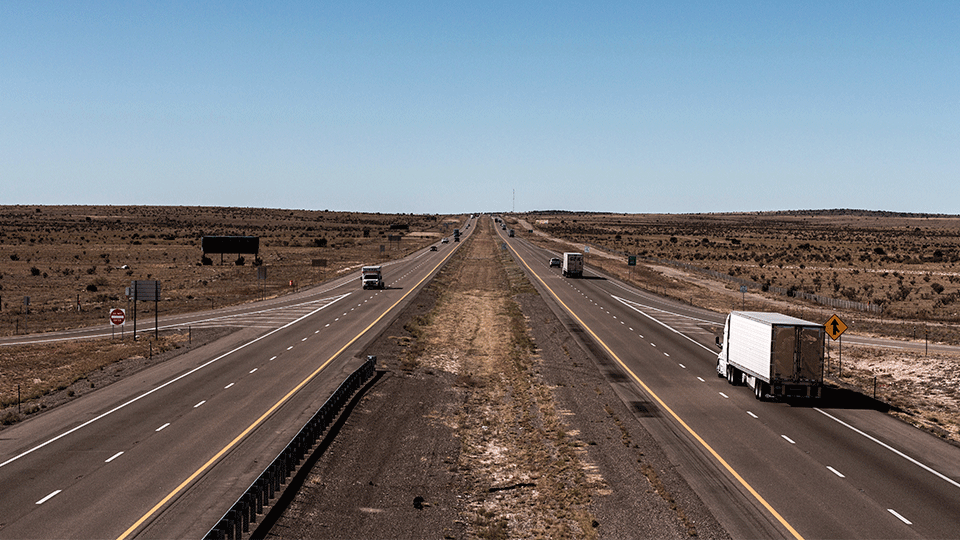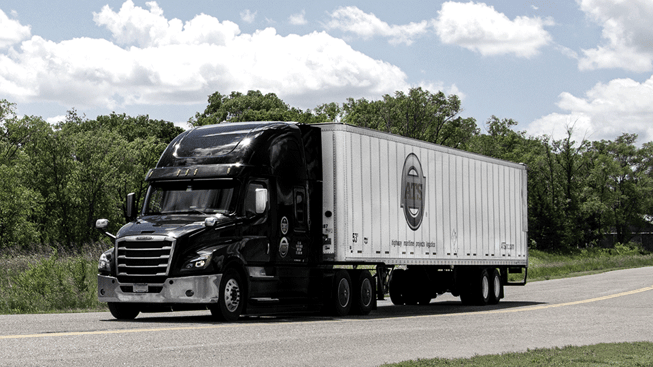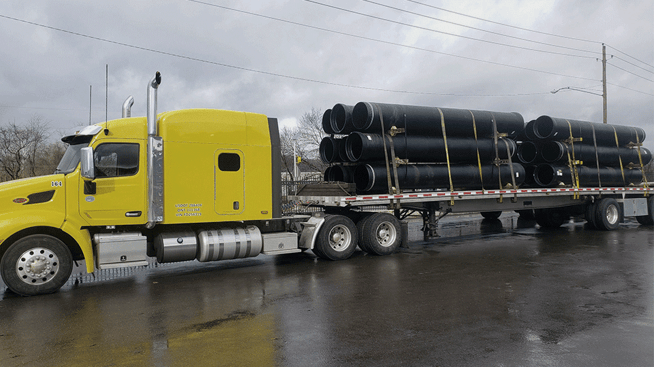 Cargo claims are never fun. Properly filing one can be both confusing and frustrating. This is especially true when working with a freight broker to move your freight.
Cargo claims are never fun. Properly filing one can be both confusing and frustrating. This is especially true when working with a freight broker to move your freight.
Since freight brokerages aren’t trucking companies, many shippers simply don’t know where to turn for compensation on an over, short, and/or damaged (OS&D) load.
Too often, relationships are compromised and budgets are over-extended due to OS&D cargo mishaps. For the companies that face these issues, confusion over who to turn to for reimbursement only exacerbates the problem.
That said, the transportation industry has some very specific guidelines for how cargo claims should be handled between a shipper, their broker, and the carrier on their load.
ATS Logistics has operated as a brokerage since 1989, so we have a firm understanding of the role a broker should play in cargo claims.
In this article, we'll explain claims liability, exceptions, and the circumstances under which a broker is responsible.
Key Takeaways for Shippers
- Carriers, not brokers, are usually liable for cargo claims under the Carmack Amendment.
- Accurate OS&D notation on the bill of lading is essential to support a claim.
- Carrier liability can be denied under five specific Carmack exceptions.
- Freight brokers help protect shippers by verifying carrier cargo insurance and guiding claims.
- Fast filing, freight preservation, and carrier-first claims improve outcomes.
What Is a Cargo Claim?
A cargo claim, also called a freight claim, is a legal demand for compensation presented by a shipper or consignee to the motor carrier that transported its freight. Usually, these claims are filed if a shipment is found to be over in total quantity, short in total quantity, and/or damaged in some way upon arrival.
Companies have a minimum of nine months after delivery to file a cargo claim and gain compensation for any damages.
Although there are many types of claims that shippers can file, like auto liability and property damage, cargo claims are by far the most common.
Who Is Liable For Cargo Claims?
According to the Carmack Amendment of the Interstate Commerce Act, the carrier is generally liable for cargo claims, not the broker.
Instead, the liability for cargo damage falls on the party directly responsible for transporting the shipment, i.e. the carrier. The carrier is inherently closest to the product at all stages (loading, transportation, and unloading), and is therefore responsible for ensuring its condition.
To help customers and carriers avoid unnecessary liability risk and keep everyone on the same page, each shipment utilizes a bill of lading (BOL). When used correctly, all issues with a shipment — whether it’s shortages or damages — should be recorded on its BOL and signed by each party present.
This acts as documented proof about whether the cargo arrived in the same condition it left the shipper.
Sometimes, though, things slip through the cracks and an OS&D shipment is delivered with a “clean” BOL. A clean BOL is a BOL on which no shortages, overages, or damages were marked, so it appears everything delivered according to plan — even if that wasn't the case.
In these instances, a cargo claim becomes much more difficult as the responsible party isn’t immediately evident. That said, more often than not, should a damaged shipment arrive with a “clean” BOL, the carrier is still the party held liable.
While it's true that, in general, carriers are liable for cargo claims rather than freight brokers, there are exceptions to every rule — so let's talk about those next.

When Is a Carrier Not Liable for Cargo Claims? 5 Exceptions
The Carmack Amendment outlines five exceptions that remove the burden of liability from freight carriers under certain circumstances.
To avoid liability, a motor carrier must prove their negligence wasn’t the reason for damaged cargo. It's still the carrier's responsibility to meet the burden of proof in these cases, but the Carmack Amendment provides for liability exceptions in instances of:
- An Act of God
- An Act of War
- An Act or Default of Shipper
- Public Authority
- Inherent Vice or Nature of the Goods Transported
Carmack Amendment Exception #1: An Act of God
This defense is applied when a motor carrier can prove that cargo damage occurred due to a natural disaster or phenomenon out of their control.
If the event happened so quickly and without warning that the carrier could not reasonably be expected to take protective action, it's likely an Act of God exception.
This often manifests as an extreme weather event, like a tornado hitting a trailer or flash flooding that damages cargo, though other events or phenomenon may also fall under this rule.
Carmack Amendment Exception #2: An Act of War
If cargo damage results from an interaction with hostile military forces, the carrier is not held responsible for claims.
This exception applies in times of war, following an act of terror, or in other scenarios where cargo transport is affected by wartime activities. It does not apply to claims related to organized crime.
Carmack Amendment Exception #3: An Act or Default of Shipper
If it can be proven that the damage in question was caused by an action or negligence of the shipper rather than the carrier, this exception applies and the carrier is not held responsible for those claims.
Examples of this include if the product was poorly packaged, loaded improperly or if —according to the BOL — the goods were OS&D when they left the shipper.
Carmack Amendment Exception #4: Public Authority
This exception is narrower than you might think: it applies only when loss, damage, or delay to freight is caused directly by an act or order of a government entity, not merely by market conditions, carrier discretion, or indirect regulatory pressure.
Examples of situations that could invoke this exception include:
- FDA-issued product recalls
- Government seizure, confiscation, or impoundment (e.g. law enforcement operations or criminal investigations)
- Mandatory road closures
- Quarantine or public health orders
This particular exception is prone to mis-attribution by carriers who mistakenly interpret the exception more broadly than what is actually provided for.
Situations that do not qualify for carrier exemption under the Public Authority use case include, but are not limited to:
- Carrier decisions to delay or reroute
- “Government regulations” in general (permits, compliance rules, hours-of-service)
- Labor strikes or protests of government orders/actions
- Traffic congestion
- Weather events on their own (unless accompanied by a mandatory, government-issued closure)
To discern whether a situation may fall under this exception, remember: government regulation is not the same thing as a direct governmental action leading to a claim.
Carmack Amendment Exception #5: Inherent Vice or Nature of Goods Transported
Some types of freight are inherently subject to decay, defects, and diseases that can quickly damage or degrade their quality, like fresh produce, dairy products, and livestock.
This quality is called an "inherent vice" or "nature of goods transported." It can be a reason for a carrier exception, but proving that a loss is due to a product's inherent vice and not carrier negligence can be difficult.
That difficulty is compounded when proper handling and transport instructions were clearly outlined in a signed contract, making inherent vice exceptions a long shot for many carriers.
How Does a Brokered Carrier Pay Cargo Claims?
Provided none of these exceptions apply, the majority of cargo claims are paid by the carrier. Freight brokers must therefore ensure that every carrier in their network has an appropriate level of insurance.
Brokered carriers should hold a minimum of $100,000 of cargo insurance. For the majority of shipments, this amount of coverage is sufficient to amend any potential mishaps.
Should a load require more than $100,000 of insurance, it’s the carrier’s responsibility to bridge this gap. By purchasing an insurance rider — a short-term addition to their policy — carriers can cover their liabilities on higher value loads.
Good freight brokers hold a high level of knowledge on carrier insurance requirements and the process of securing a rider. And, when needed, these brokers are able to lend their expertise to ensure that all necessary coverage is secured.
Related: How Should a Freight Broker Monitor the Safety of Its Carriers?
When Is a Freight Brokerage Responsible for Cargo Claims?
Your freight brokerage is only charged with paying a cargo claim if they’ve opted into this responsibility contractually. In these instances — when a broker has assumed cargo liability in a shipper-broker contract — the full responsibility of these claims lands on this brokerage.
To pay the cargo claims they owe, good freight brokers maintain two types of insurance:
- Freight brokerage operations coverage
- Contingent cargo insurance
Related to paying claims, these insurance types have different applications. That said, should a cargo claim arise, holding these policies helps brokers make their customers whole.

What Is Freight Brokerage Operations Coverage?
For a freight brokerage that opts into freight claim liability risk, for whatever reason, freight brokerage operations coverage helps them follow through on this commitment.
Although operations coverage — also called general liability coverage —is offered in varying degrees, brokerages purchase it to cover their business in times of incident.
Operations coverage isn’t solely designed for use with cargo claims, but instead, offers more blanketed protection for brokers. That said, if you have a contract with a brokerage that places cargo liability into their court, expect to receive payment from their operations coverage.
What Is Contingent Cargo Insurance?
Unlike operations coverage, freight brokers aren’t legally required to carry contingent cargo insurance. This insurance, meant to pay the expense of a legitimate cargo claim not covered by a carrier’s policy, provides an added layer of insulation for many shippers.
The level of coverage contingent cargo insurance offers brokers usually mirrors that of a carrier’s policy. Even though the majority of cargo claims paid by a brokerage will come from their operations coverage, holding contingent cargo insurance is a valuable addition to a broker’s service offerings.
How Can You Make Your Claim Go as Smooth as Possible?
Sure, your freight brokerage may not be responsible for paying your cargo claim. But that doesn’t mean they’ll simply wash their hands of the problem and move on.
Although some brokers might take this route and leave their customers hanging, the best companies never would. Instead, a great freight broker will continue to facilitate your claim until the Motor Carrier’s insurance makes its final decision and concludes it.
By leveraging their relationship with your carrier, and offering advice where necessary, a broker’s expertise can make a real impact on how smoothly your claims process goes.
In the interest of giving you the tools you need to succeed, let’s discuss four things that will help you get the most from your next freight claim.
1. Properly Notate Your Bill of Lading (BOL)
A shipment’s bill of lading couldn’t be more important to the claims process. It’s very difficult to prove where damage to a shipment occurred without written documentation to back it up. The BOL is this documentation.
Every time freight changes hands — from shipper to carrier and from carrier to consignee — its condition should be written down along with the signatures of all parties present.
If your product isn’t damaged when it leaves your warehouse but arrives at your receiver in poor condition, this should be noted. If you load less product than the stipulated amount, be sure to jot this down on the BOL to prevent confusion on the back-end.
Whatever it may be, the more information you record on the BOL, the better. You’ll find that doing so will make filing your cargo claim much easier.
2. File a Claim as Soon as You Can
As it currently sits, cargo claims can be filed up to nine months after a shipment is delivered.
This isn’t to say that you should wait until the last moment to file yours.
To promote a smooth claims process, it is best to get the ball rolling as soon as you can. Work with your broker to get the contact information for the carrier on your load and take action quickly. This helps to avoid issues that may pop up as time goes on such as lost paperwork or missing information.
3. Hold Onto Damaged Cargo For Insurance Purposes
Sometimes a consignee will reject the receipt of cargo when it's damaged or believed to be damaged. Though it may seem easier, disposing of these products, no matter their condition, is not recommended in these situations.
The owner of these goods has a duty to reduce these claims, either through repair or another form of salvage.
So, for a better chance at a successful freight claim — a claim that will often require investigation by an insurance company — it’s important that you hold onto this cargo. Using these products as physical evidence, coupled with a properly noted bill of lading, will make your claim go as smoothly as possible.
Additionally, keeping these goods under your watch and utilizing them to your advantage can expedite this process – ensuring you’re awarded in a timely manner.
4. File The Claim With The Carrier Responsible for Transportation First
In most cases, the carrier responsible for moving your freight will be responsible for paying your claim. Covering freight claims is the reason they hold cargo liability insurance to begin with.
As such, your carrier should be the first party you reach toward to fulfill your cargo claim.
Even though a good brokerage holds insurance for these purposes as well — and will take steps to make everything right for you — filing your claim with the liable party first will expedite this process.
5. Cooperate at All Steps of The Process
Do everything you can to cooperate with insurance adjusters, fill out all forms and file all necessary documents. As tedious as it may seem, promoting a smooth claims process can often come down to how well you cooperate.
If you’re looking for a $50,000 payment, make sure you have an invoice ready to prove the value of the product in question. Failing to cooperate throughout this process will do nothing but draw it out unnecessarily.
Pick the Right Freight Brokerage
At the end of the day, your freight brokerage should be dedicated to helping you succeed. Although filing a cargo claim isn’t easy, selecting the right broker to lean on through this process will help substantially.
If you're looking to add a few reliable brokers to your freight network, download The Freight Brokerage Selection Checklist. This free tool is designed to help you vet transportation providers and weigh companies against each other, so you can make the best possible decision for your freight network.




